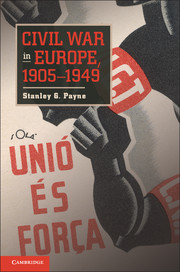Book contents
- Frontmatter
- Contents
- Preface
- Chronology of Events
- Glossary of Political Acronyms
- Introduction Revolution and Civil War as Forms of Conflict
- Part One World War I and An Era of Internal Conflict, 1905???1935
- Part Two The Conflict In Spain, 1931???1939
- Part Three Civil War and Internal Violence in The Era of World War II
- Index
- References
Introduction - Revolution and Civil War as Forms of Conflict
Published online by Cambridge University Press: 05 June 2012
- Frontmatter
- Contents
- Preface
- Chronology of Events
- Glossary of Political Acronyms
- Introduction Revolution and Civil War as Forms of Conflict
- Part One World War I and An Era of Internal Conflict, 1905???1935
- Part Two The Conflict In Spain, 1931???1939
- Part Three Civil War and Internal Violence in The Era of World War II
- Index
- References
Summary
Civil war, as a form of armed conflict within a single political unit rather than a foreign war between two different polities, is one of the oldest forms of strife. It may take one or more of many different forms, which include “most revolutions, sustained peasant insurrections, ‘revolutionary’ or ethnic insurgencies, anti-colonial uprisings, and resistance wars against foreign occupiers.” Significant political violence alone, however, is not enough to constitute genuine civil war, which must involve an extended contest of arms to win state power, even if waged by means of irregular warfare.
Historically, the most important civil wars have tended to cluster in three different sorts of conflicts: a) dynastic succession conflicts, b) wars of secession or national liberation, and c) full-scale political or ideological civil wars to impose or thwart the imposition of a new or revised model on the polity. In some of them more than one kind of conflict has been combined, or other features have been added to give them an even more complex character. Any of these conflicts, for example, may include secondary mini–civil wars fought to some degree within one of the contending sides, as in the internal civil war in some regions that attended the war of independence of the American colonies. Similarly, there may be mini–civil wars within a greater civil war, as happened during the Spanish civil war in May 1937 in Barcelona and in March 1939 in Madrid.
- Type
- Chapter
- Information
- Civil War in Europe, 1905–1949 , pp. 1 - 12Publisher: Cambridge University PressPrint publication year: 2011



